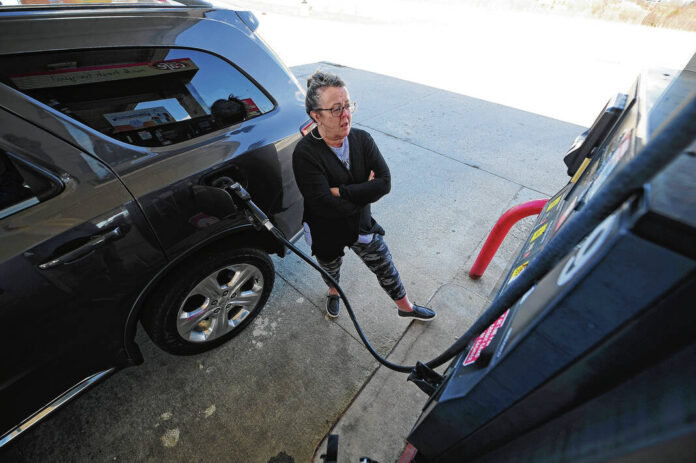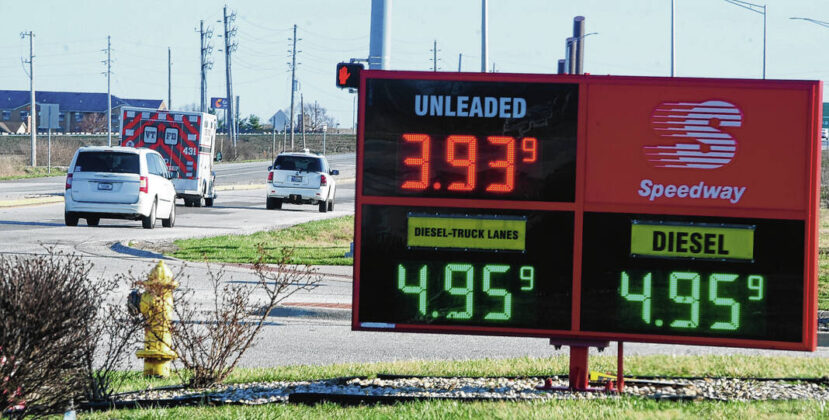
Lynnette Goodwin waits while pumping gas at a local station in Hancock County. The war in Ukraine has contributed to elevating fuel prices to levels not seen in decades. Sunday, March 27, 2022.
Tom Russo | Daily Reporter
HANCOCK COUNTY — Russia’s invasion of Ukraine is a power grab that could reshape geopolitics — and the ripple effects are being felt around the world and across the U.S.
From gas prices to agricultural markets, as well as a Greenfield-based company with a location in Moscow, impacts from the conflict have reached Hancock County.
Russia provides vast amounts of oil and gas to the world, and after the country began its invasion, U.S. benchmark crude oil surged past $100 a barrel. When oil prices rise, that leads to higher gasoline prices, although the spike in gasoline prices can come later. Drivers are already feeling pain at the pump, paying an average of $4.18 in Indiana for a gallon of regular, nearly 57% higher than the same time last year, according to AAA.
The biggest driver is the price of crude oil, which has been rising over the past year. As more people get on the road after being cooped up during the pandemic, oil and gas suppliers that had scaled back production during the COVID-19 pandemic lull in demand are struggling to keep up. And decisions by the OPEC+ oil cartel, led by Saudi Arabia and Russia, to only modestly increase the oil they released to the market kept prices high. Global oil prices have climbed even higher as Russia invaded Ukraine and many buyers shunned Russian crude, reducing the viable global oil supply.
Crude oil was a little over $90 a barrel before Russia’s invasion, and spiked to nearly $124 in early March before declining back below $100 again by the middle of the month. It’s been rising ever since, however, and was almost $114 as of last Friday.
That deviation has been felt by the gas stations that are part of the Leo’s Market & Eatery chain, which has a Greenfield location.
Keith White, a partner and vice president with Greenfield-based Pride Investment Partners, which owns Leo’s Market & Eatery, said midday gas price increases and decreases have been somewhat common lately.
“It’s just been kind of volatile, up and down,” White said.
The biggest impact to the business’ fuel operations, he continued, has been being placed on allocation by its supplier, limiting the amount of gas it can get to offer to customers.
“I think some of that is trying to curb panic buying,” he said.
White added rising gas prices have affected business in other ways too, like leaving customers with less money to spend on other products Leo’s offers, and requiring employees to pay more to get to work.
“We would assume have it cheaper, for sure,” he said.
The war has numbers bouncing in agriculture’s economy as well. Jonathan Sparks, a Hancock County farmer and a district director for the Indiana Farm Bureau, recalled soybean prices per bushel spiking about 70 cents early on in the invasion before falling back down.
“Really the biggest thing it has brought us is volatility,” Sparks said. “Futures markets don’t like uncertainty, and that’s what has driven a lot of that I think.”
When Russia invaded Ukraine on Feb. 24, grain elevators in Indiana were reporting corn prices of about $6.60 per bushel and soybean prices around $16.50 per bushel. On Monday, corn was around $7.08 per bushel and soybeans were around $16.30 to $16.45 per bushel, down from prices in the $16.60s and $16.70s last week.
It’s contributed to a long-term trend for prices that were already up, Sparks said, adding the boost had been plateauing somewhat due to a combination of factors, including harsh weather in South America during its farming season.
Sparks noted Ukraine is one of Eastern Europe’s largest grain exporters, especially wheat.
“They were the bread basket of the old Soviet Union,” he said.
With the challenges Ukraine faces as it resists the Russian invasion, U.S. agriculture may find itself expanding its export trading partners.
“If they’re not able to export, or they’re not able to harvest or raise a crop, then ultimately, in a global supply, those countries will need to get those commodities somewhere else, and we become a more inviting seller for the grain to the rest of Europe,” Sparks said.
The upheaval also has a company headquartered in Greenfield thinking about its Moscow location and the people of Ukraine.
“At Elanco, we condemn the war in Ukraine and are deeply concerned for those impacted, both inside and outside of the country’s borders,” Elanco Animal Health said in a statement. “The well-being and safety of our Elanco employees and their families, partners, and customers in the affected region remains top of mind.”
The company added that the Elanco Foundation will make up to a $150,000 donation to support the European Food Bank Federation in its efforts to feed people in need in Ukraine.








